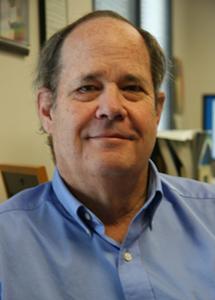Meet EPA Scientist Robert Devlin, Ph.D.

EPA scientist Dr. Robert Devlin's main research interest is understanding the human health effects of air pollution. His research is used to characterize the effects that inhaled substances, such as air pollutants, have on human pulmonary (related to lungs and breathing) and cardiovascular (heart, lungs, and blood flow) health, and the physiological changes responsible for those effects.
When he retires Dr. Devlin hopes to become a star on the senior PGA golf tour as well as a movie reviewer for Entertainment Weekly.
How does your science matter?
I know my research matters because the results help set standards that protect people from real world exposures to air pollutants. As an example, we did a study a few years ago examining the lowest level of ozone that people could be safely exposed to and still be safe. Being able to conduct a study that ensures that our standards protect the public is important, and it makes you feel like your work means something.
We’re also interested in figuring out what we can tell people so they can protect themselves from air pollutants if they find themselves in a place with higher air pollution levels than EPA believes is safe (Editor's note: for more information, also see EPA's Healthy Heart web page). We just completed a study, in which we found a positive relationship between taking fish oil tablets and protecting yourself against some of the effects of air pollution on the cardiovascular system.
Tell us about your background.
I grew up in Texas and got my doctorate from the University of Virginia in the area of developmental biology. My graduate research involved looking at genes that control the development of muscles in bird embryos using molecular biology approaches. I was on the faculty for Emory University for several years doing that research right after receiving my doctorate.
How did you get to EPA?
One day, I saw a job advertised within the U.S. EPA involving the effects of air pollution on people. I thought that would be a really neat thing to do because it clearly could make a difference. Doing basic research in academia is intellectually challenging but doesn’t offer the satisfaction of knowing that your work counts for something. I really enjoy what I'm doing; I've stayed here 27 years working in the Environmental Public Health Division of EPA.
When did you first know you wanted to be scientist?
When I was an undergraduate, I was advancing towards a pre-med major. I knew I was going to go to medical school since I was in middle school. At the beginning of my senior year of college, I started taking some courses that gave me an opportunity to work in laboratories, which I'd never done before.
I was accepted to medical school and prepared to go, but somewhere along the line, I decided that I liked research much better. I decided to go to graduate school, rather than medical school, because it would give me more research opportunities. I’m glad I did that.

What do you like most about your research?
I’ve always said that if the day comes when I no longer look forward to coming into work on Monday, it’s time to find a different job. After nearly 30 years working here, that day has not yet come. I am blessed to be able to work with people that I truly enjoy being around and in a job that allows me to make a contribution to protecting the environment.
If you were not a scientist, what would you be doing?
All of my colleagues tell me I'm a really good salesperson. If I weren't doing research, I'd probably wind up being a lawyer -- trying to convince judges or juries of whatever I’m defending or prosecuting -- because I do enjoy verbal interaction and talking with people.
Any advice for students considering a career in science?
Obviously, I would recommend anyone who has an interest in it to follow it. Applications for graduate school in science areas are going down year by year, so if you're looking at a career where there will be jobs available that's certainly going to be a good area. It's also a very intellectually interesting job where it's different day-to-day. What I do now is very different than what I did a year ago, and what I did a year ago was different than what I did 10 years ago. It's not a static job that stays the same, there’s a new challenge every day, every year.
Resources:
- Healthy Heart
- Controlled Exposure of Healthy Young Volunteers to Ozone Causes Cardiovascular Effects
- Omega-3 fatty acid supplementation appears to attenuate particulate air pollution-induced cardiac effects and lipid changes in healthy middle-aged adults.
Editor's Note: The opinions expressed herein are those of the researcher alone. EPA does not endorse the opinions or positions expressed.
